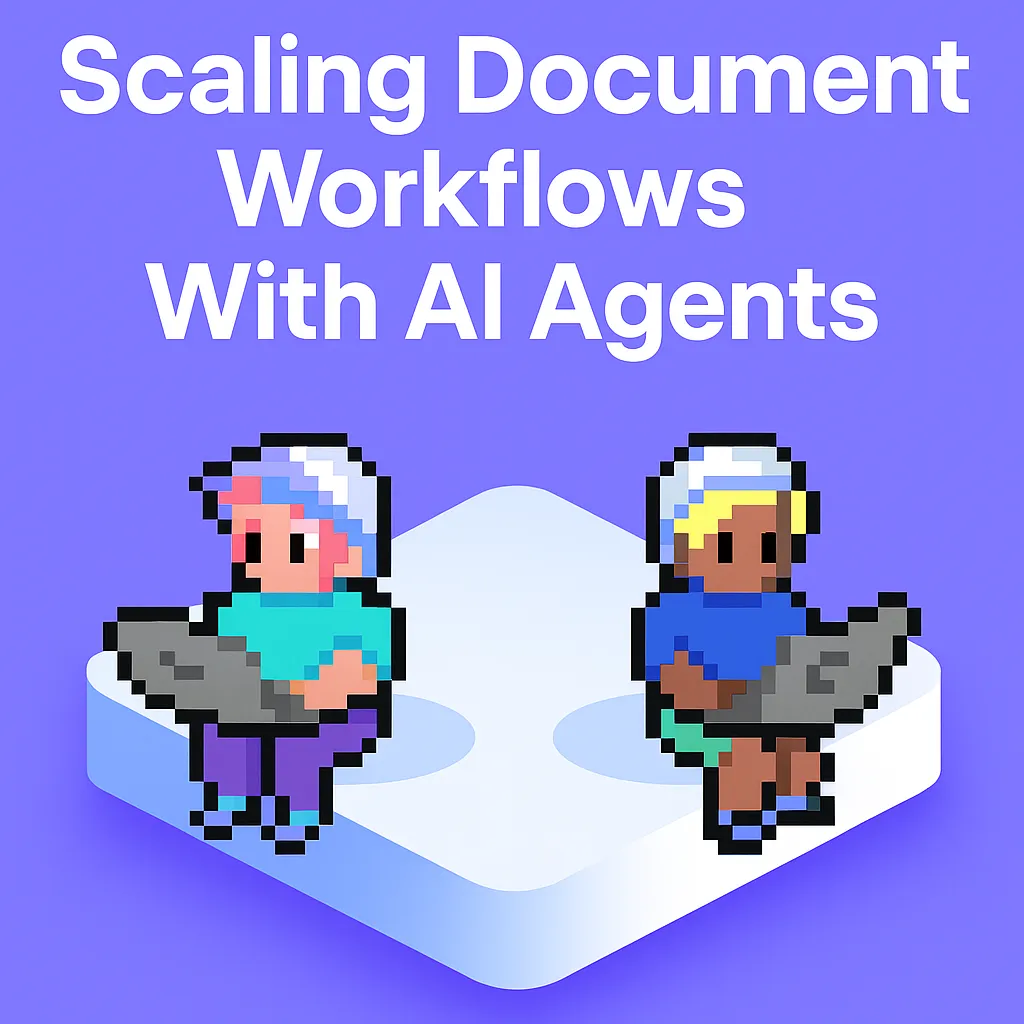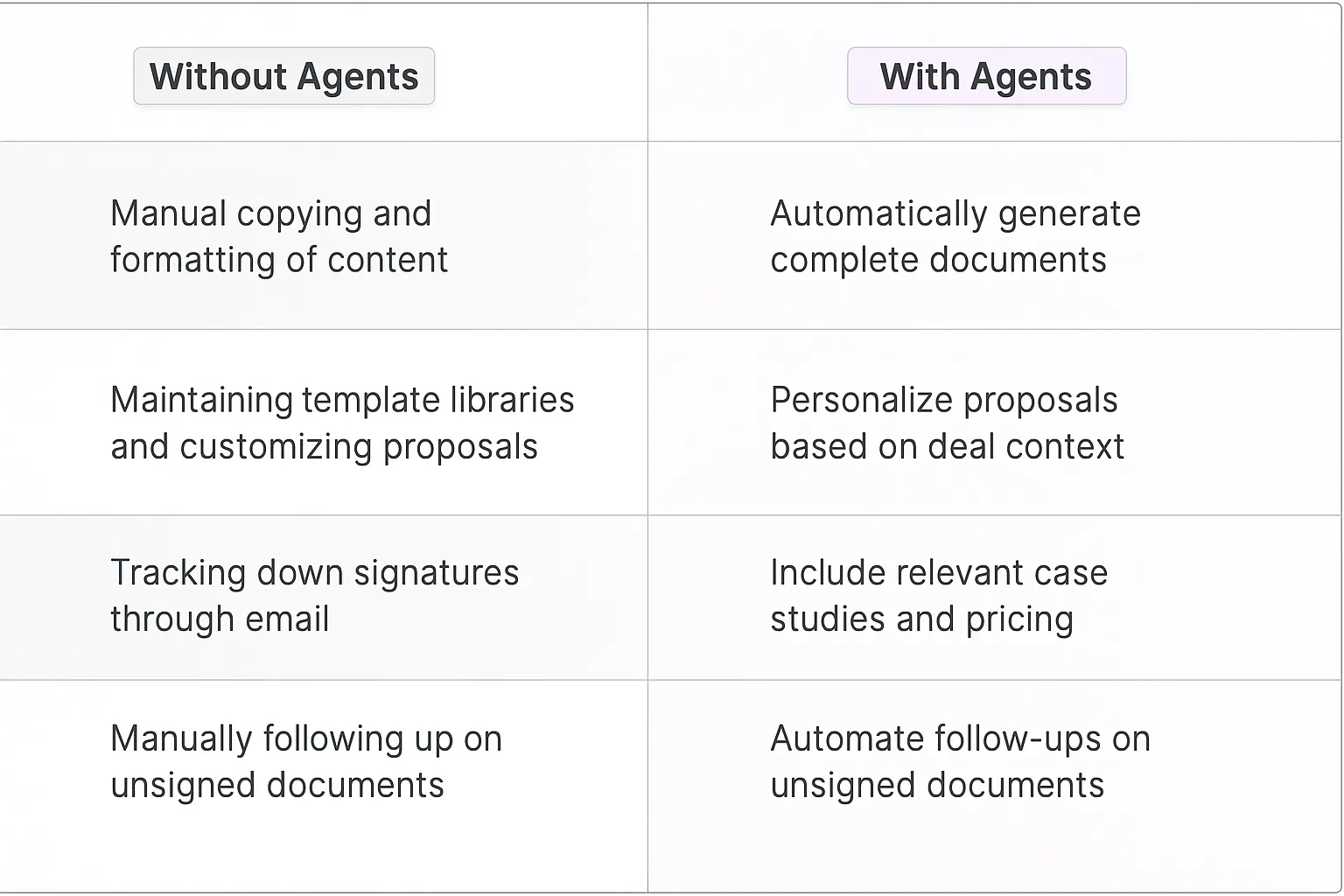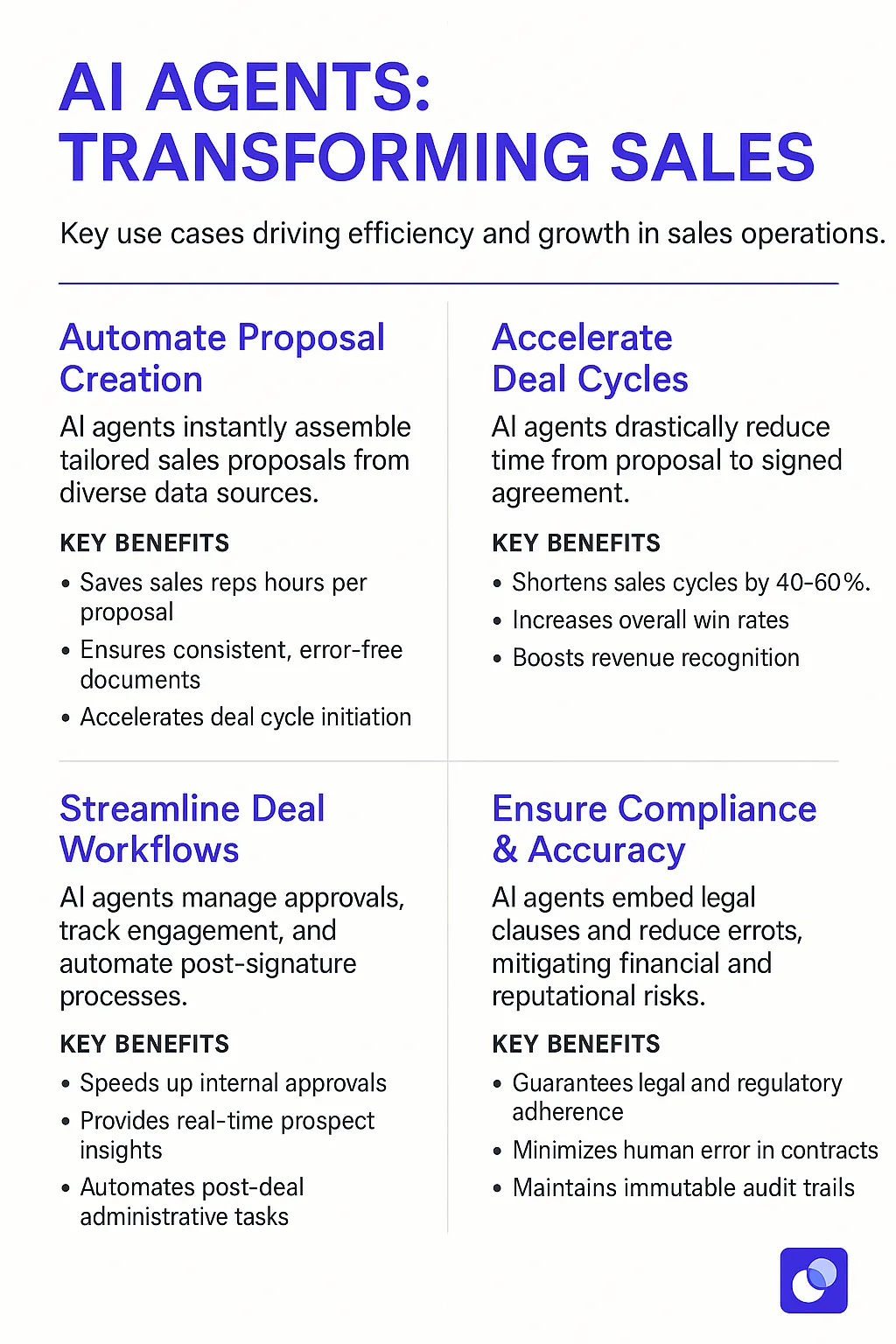PandaDoc
Understanding PandaDoc's Document Management Evolution
What is PandaDoc?
PandaDoc stands as a comprehensive document workflow platform that handles everything from creation to execution. The platform combines document generation, e-signatures, and analytics into a unified system that helps organizations close deals faster and manage documentation more effectively. With the addition of AI capabilities, PandaDoc has evolved from a simple document management tool into an intelligent business partner.
Key Features of PandaDoc
The platform's core strengths lie in its dynamic document creation tools, automated workflow capabilities, and robust analytics. Key features include customizable templates, real-time document tracking, integrated e-signatures, and CRM integration. The platform excels at maintaining version control, ensuring compliance, and providing detailed analytics on document performance and engagement.

Benefits of AI Agents for PandaDoc
What would have been used before AI Agents?
Document creation and management traditionally required manual effort from sales teams and administrators. Teams spent countless hours copying and pasting content, formatting documents, and tracking down signatures. The process involved maintaining extensive template libraries, manually customizing each proposal, and following up on unsigned documents through email chains. Sales reps often got bogged down with document preparation instead of focusing on building relationships with prospects.
What are the benefits of AI Agents?
AI Agents transform PandaDoc's document workflow by bringing intelligence and automation to previously tedious tasks. These digital teammates can generate complete sales proposals by analyzing historical data and deal context, ensuring proposals are tailored to each prospect's specific needs and industry.
The agents handle complex document assembly by automatically pulling relevant case studies, pricing tables, and terms based on the deal parameters. They can detect and fix formatting inconsistencies, suggest relevant content blocks, and even optimize language for better conversion rates based on successful past proposals.
When integrated with CRM data, these agents provide smart recommendations for cross-selling opportunities and automatically update document sections when deal terms change. They monitor document engagement in real-time, alerting sales reps when prospects view critical sections or when signatures are delayed.
Most significantly, AI Agents reduce document creation time from hours to minutes while maintaining consistency across all customer-facing materials. This allows sales teams to scale their proposal process without sacrificing quality or personalization. The result is a more efficient sales cycle where reps can focus on high-value activities while maintaining professional, data-driven documentation.
The intelligence layer also extends to post-signature workflows, automatically triggering next steps, updating relevant systems, and providing analytics on document performance across the organization. This creates a continuous improvement loop where each interaction makes the system smarter and more effective.

Potential Use Cases of AI Agents with PandaDoc
Processes
Digital teammates integrated with PandaDoc transform document workflows by handling complex document creation and management tasks. They excel at analyzing contract terms, extracting key data points, and maintaining document version control - tasks that typically consume hours of valuable team time.
The AI agent monitors document statuses, tracks approval workflows, and proactively notifies stakeholders when action is needed. When sales teams need to generate proposals quickly, the agent pulls relevant pricing, product details, and customer information to assemble polished documents that maintain brand consistency.
Tasks
- Automatically generating customized sales proposals by pulling data from CRM systems and product catalogs
- Analyzing contracts to flag potential issues, inconsistencies, or missing information before documents go to stakeholders
- Creating document templates by studying successful past proposals and contracts to identify winning patterns
- Managing the entire signature collection process - from sending reminders to verifying completed signatures
- Extracting key metrics and creating reports on document performance, close rates, and bottlenecks in approval workflows
- Maintaining an audit trail of all document changes and approvals for compliance purposes
- Converting legacy PDF documents into editable PandaDoc formats while preserving formatting
- Automating the creation of standard business documents like NDAs, MSAs, and statements of work
The real power emerges when these AI capabilities compound - a digital teammate can handle the end-to-end document lifecycle from creation through execution, freeing up human teammates to focus on relationship building and deal strategy. The system becomes more valuable over time as it learns from each interaction, developing an understanding of what works best for different scenarios and stakeholders.
For growing companies managing hundreds or thousands of documents, this intelligent automation creates massive leverage. Sales teams close deals faster, legal teams reduce review cycles, and operations teams maintain better visibility - all while reducing errors and improving compliance.

Industry Use Cases
PandaDoc AI agents fundamentally transform how different sectors handle their document workflows. Drawing from my experience working with hundreds of startups and enterprises, I've observed that the real power lies in how these digital teammates adapt to industry-specific document needs.
The integration of AI within PandaDoc creates unique opportunities across various business sectors, each with its own document management challenges and regulatory requirements. What's particularly fascinating is how these AI capabilities have evolved from basic document automation to becoming sophisticated partners in complex document workflows.
When analyzing the impact across industries, we see patterns emerging in how different sectors leverage these tools. Sales teams in technology companies handle their proposals differently from legal firms managing contracts, yet both benefit from AI-enhanced document processes in ways specific to their needs.
Looking at concrete applications across sectors reveals how PandaDoc's AI agents tackle industry-specific challenges while maintaining compliance and improving accuracy. The following examples demonstrate how various industries are putting these capabilities to work in their daily operations.
Real Estate: Transforming Property Transactions with PandaDoc AI
Real estate transactions involve complex document workflows that can make or break million-dollar deals. PandaDoc AI agents function as digital transaction coordinators, handling the intricate documentation process that traditionally bogs down real estate professionals.
When a property goes under contract, the AI agent automatically generates and customizes all necessary documentation - from purchase agreements to disclosure forms - based on specific property details, local regulations, and transaction parameters. The system pulls data directly from MLS listings and buyer profiles to populate documents with precise information, eliminating error-prone manual entry.
The real power emerges in multi-party transactions. The AI agent orchestrates the document flow between buyers, sellers, agents, title companies, and lenders. It tracks signature status, sends intelligent reminders, and flags potential compliance issues before they derail deals. For example, if a required disclosure form is missing or a signature is incomplete, the system proactively alerts relevant parties and suggests corrective actions.
Beyond basic document management, the AI analyzes historical transaction patterns to identify optimal timing for each step. It learns from successful closings to recommend the most effective document sequences and approval workflows. This pattern recognition helps real estate professionals close deals faster while maintaining compliance.
The measurable impact is significant: Real estate offices using PandaDoc AI agents report 60% faster document preparation times and a 45% reduction in transaction delays caused by paperwork issues. For high-volume brokerages handling dozens of concurrent deals, this efficiency translates directly to increased revenue and improved client satisfaction.
This AI-driven approach to real estate documentation represents a fundamental shift from reactive paper-pushing to proactive deal acceleration. The technology doesn't just digitize existing processes - it reimagines the entire transaction workflow around speed, accuracy, and compliance.
Technology & Software: Scaling Enterprise Sales with PandaDoc AI
Enterprise software sales cycles often collapse under the weight of complex documentation requirements. PandaDoc AI agents function as deal acceleration engines, transforming how tech companies manage their sales documentation from initial proposals through final MSAs.
The AI's deep understanding of software licensing structures allows it to dynamically generate precise agreements based on specific product configurations, user tiers, and custom requirements. When a sales rep inputs basic deal parameters, the system automatically crafts proposals that reflect accurate pricing, terms, and technical specifications - eliminating the back-and-forth that typically delays enterprise deals.
Most impressively, the AI agent learns from each closed deal to optimize future documentation. It analyzes which contract terms resonate with different customer segments, which pricing structures lead to faster signatures, and which legal provisions require the most negotiation. This pattern recognition helps sales teams front-load winning elements into their initial proposals.
The system's ability to handle complex approval matrices sets it apart. In enterprise software sales, documents often require sign-off from procurement, legal, security, and executive teams. The AI agent orchestrates this intricate dance, routing documents in optimal sequences and maintaining version control across multiple stakeholders. When legal teams request changes, the system automatically propagates updates across all related documents while preserving audit trails.
Data shows the impact: Software companies using PandaDoc AI agents see 40% shorter sales cycles and a 35% increase in deal velocity. For companies selling six and seven-figure contracts, this acceleration directly impacts revenue recognition and growth trajectories.
The technology fundamentally shifts how software companies approach enterprise sales documentation - moving from a bottleneck to a competitive advantage. By removing friction from the paper process, sales teams can focus on what matters: building relationships and delivering value to customers.
Considerations & Challenges
Implementing PandaDoc AI agents requires careful planning and strategic consideration across multiple dimensions. Organizations need to evaluate their document workflows, user readiness, and technical infrastructure before deployment.
Technical Considerations
API integration complexity often presents the first hurdle. Teams must ensure their existing tech stack can handle the additional load and data processing requirements. Document parsing capabilities may need enhancement, particularly for legacy systems storing historical contracts and templates.
Data security protocols require thorough review, as PandaDoc AI agents interact with sensitive business documents. Organizations need robust encryption, access controls, and audit trails to maintain compliance with industry regulations.
Operational Adjustments
Teams typically need 2-3 months to adapt their workflows around AI-enhanced document processes. This includes:
- Redefining approval chains and signing authorities
- Creating new template libraries optimized for AI processing
- Establishing quality control checkpoints for AI-generated content
- Developing fallback procedures for complex edge cases
Change Management
User adoption represents a significant challenge. Legal teams often show initial skepticism toward AI-generated contract modifications. Sales teams may resist changes to their established document creation routines. A phased rollout with dedicated training sessions helps address these concerns.
Cost Considerations
Beyond the direct subscription costs, organizations should budget for:
- Initial system integration and customization
- Staff training and enablement resources
- Potential increases in API usage fees
- Regular template maintenance and optimization
Success metrics should track both quantitative improvements in document processing speed and qualitative feedback from key stakeholders. Regular assessment helps identify optimization opportunities and justify the investment.
AI-Powered Document Management: A Transformative Evolution
The integration of AI Agents with PandaDoc represents a fundamental shift in how organizations handle document workflows. The technology moves beyond simple automation to deliver intelligent, context-aware document management that learns and improves over time. For organizations dealing with high-volume document processes, this combination of AI and document management creates significant competitive advantages through faster deal cycles, reduced errors, and improved compliance. The real value emerges as these systems learn from each interaction, continuously optimizing document workflows and enabling teams to focus on strategic activities rather than administrative tasks.













